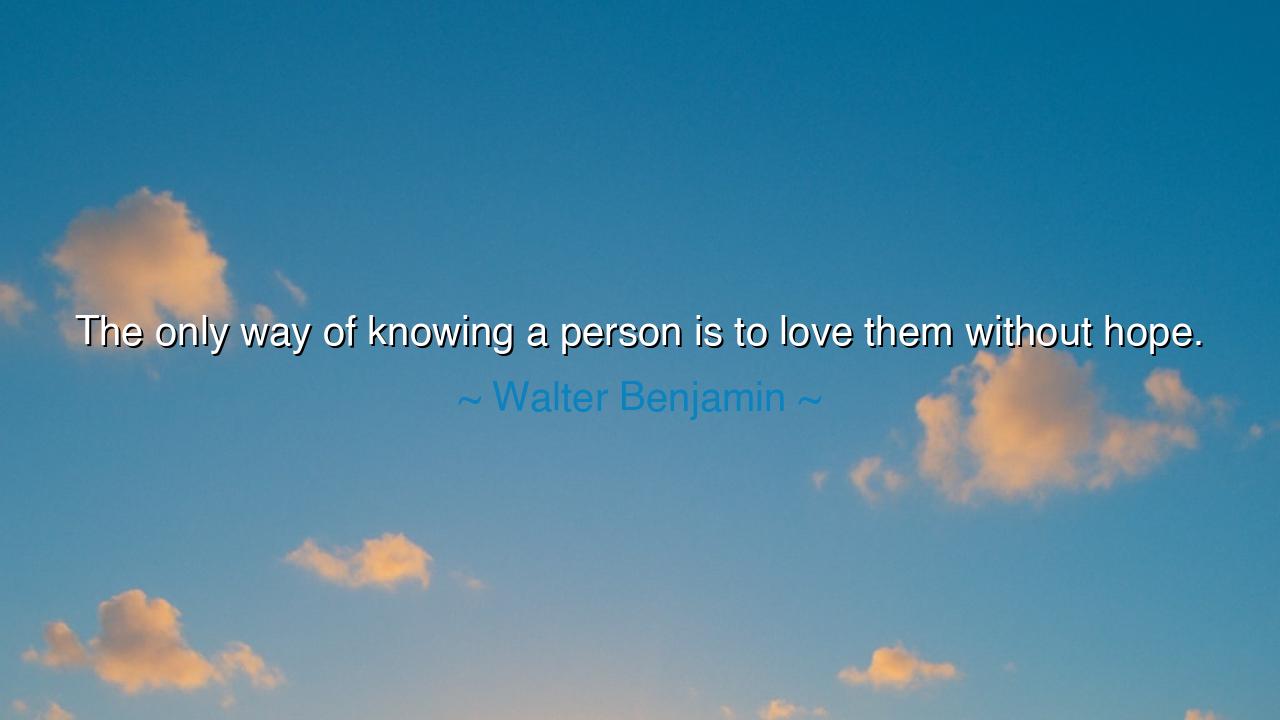
The only way of knowing a person is to love them without hope.






The words of Walter Benjamin, “The only way of knowing a person is to love them without hope,” emerge from the depths of a soul that understood both the beauty and the tragedy of human connection. They are not the words of romance, but of revelation. In them lies a paradox as old as the human heart: that true understanding of another does not come through desire, expectation, or judgment — but through love stripped of possession, love that asks for nothing in return. Benjamin, a philosopher and poet who lived through exile, war, and personal sorrow, knew well the limits of reason. He saw that only through selfless love — the kind that releases rather than grasps — can we truly see another human being as they are, not as we wish them to be.
To love “without hope” does not mean to love without light or faith. It means to love without demand — without seeking reward, change, or completion through the other. In this sense, Benjamin’s teaching echoes the wisdom of the ancients, who spoke of agapē, the highest form of love: unconditional, transcendent, free from the ego’s hunger. The lover who loves without hope stands in the posture of humility, saying, “Let me know you as you are, not as I dream you to be.” Only then does perception become clear; only then does knowledge deepen into understanding. For as long as love carries hope — the hope of gain, of reciprocity, of fulfillment — it is still entangled in the self.
Benjamin’s words were born from a world that had forgotten tenderness. Living through the rise of tyranny and the collapse of nations, he saw how people sought to define others by ideology, by usefulness, by their reflection in the mirror of self-interest. Against this, he offered a radical truth: to know another, one must first surrender the desire to control them. Love without hope is not a transaction; it is a form of freedom. It allows the beloved to exist fully in their mystery, unmeasured and unbound. This kind of love does not seek to own, but to behold.
Consider the story of Mother Teresa, who cared for the dying and destitute in the streets of Calcutta. She did not hope for thanks, reform, or recognition; her love was pure service, offered freely to those who could give nothing in return. In her tenderness toward the broken, she came to know the sacred within the human — not through success or reward, but through unconditional compassion. That is what Benjamin meant: that love becomes knowledge only when it transcends desire. When we cease hoping to change others, we begin to see them — and in seeing them, we see the divine within ourselves.
This teaching also resonates with the philosopher Søren Kierkegaard, who wrote that the greatest love is that which "hopes all things and yet expects nothing." Both thinkers understood that hope, when bound to outcome, distorts love’s purity. To hope that someone will love you back, to hope that your kindness will be repaid, to hope that your affection will alter another’s soul — these are natural desires, but they veil the truth. Real love sees not the mirror of self but the face of the other, radiant and imperfect, and says: “You are enough as you are.” In that moment, love becomes a form of sacred knowledge.
Yet this path is not easy. To love without hope is to enter the realm of vulnerability, to accept that love may go unanswered. It requires the courage to give without assurance and to stay open even in loss. But the ancients would tell us: such love is the fire of transformation. For in releasing expectation, one’s heart is purified. The soul becomes spacious, capable of compassion that extends beyond personal ties to encompass all living things. It is the love of the sage, the artist, the saint — love that sees through the veil of appearances to the eternal essence beneath.
So, my listener, take this lesson to heart: do not love to possess; love to understand. When you love another, let it not be for what they can give, but for what they are. Listen without agenda. Forgive without condition. See without illusion. In doing so, you will come to know not only the other, but yourself — for selfless love is the mirror in which truth is reflected. This is what Walter Benjamin meant: that love, when freed from hope, becomes the highest form of knowledge — the wisdom of the heart that no philosophy can teach and no despair can destroy.
For in the end, to love without hope is to love as the universe loves — quietly, endlessly, without demand, yet full of light. And in such love lies both the knowing of another and the salvation of the self.






AAdministratorAdministrator
Welcome, honored guests. Please leave a comment, we will respond soon